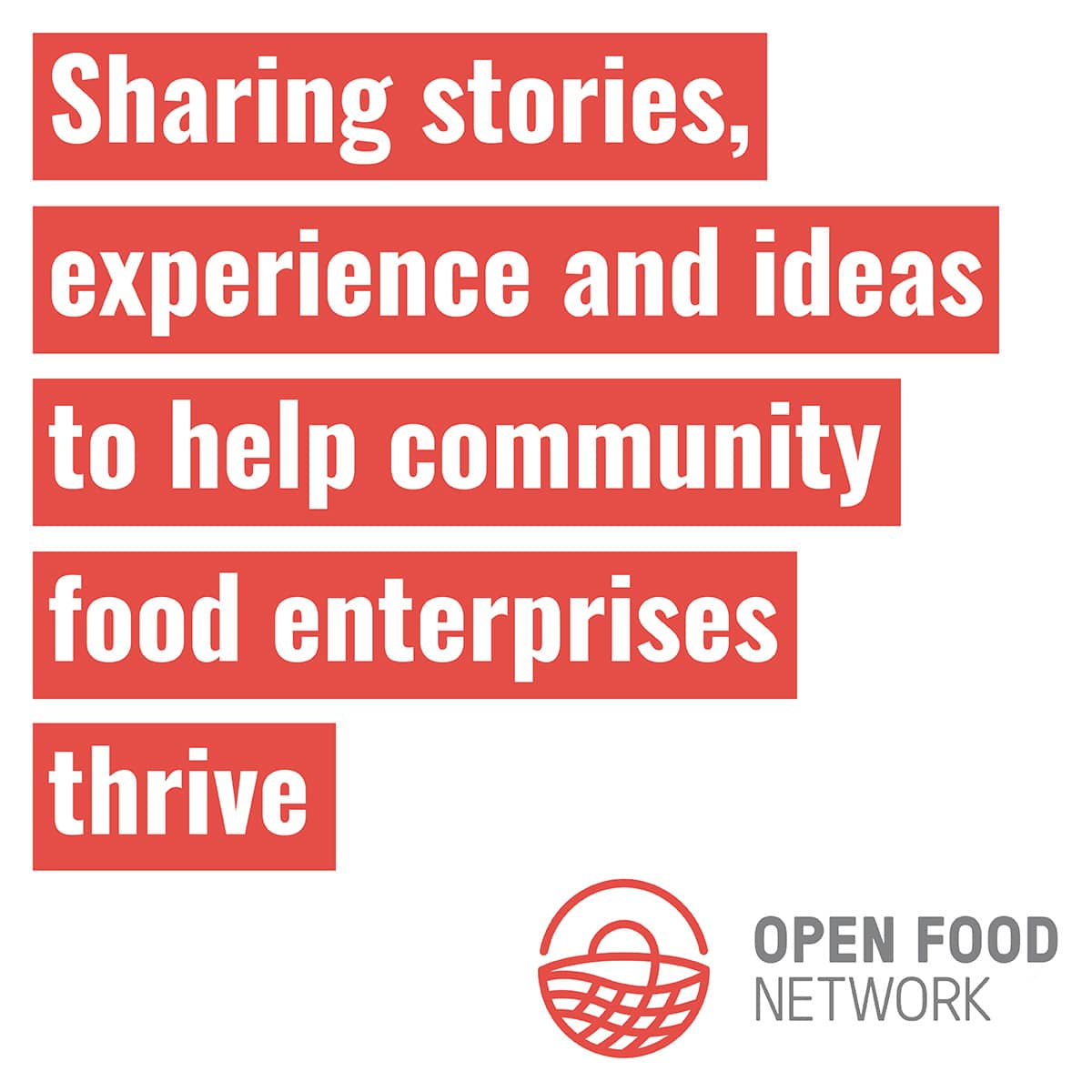Joe McCrohon
Aside from hunger, one of the most pernicious aspects of food poverty is an inability to access and afford good quality food. As a result, people are pushed towards poorer quality food, which has long term impacts upon individuals health and wellbeing, particularly in children. Experiencing food shortages as a child can impact learning, education outcomes and in turn future prospects. It is possible to trace our cultural obsession with low nutrient, high calorie foods like grains to a productivist attitude towards food after the nation nearly starved during WWII. Combined with prevailing economic theory which has a focus on profits above all else the majority of our food could be described as “food from nowhere” – in which neither the quality, production methods or provenance of food is important. All the food hubs that will be discussed are aiming to end that paradigm and ensure those who require it can access “food from somewhere” for a reasonable price. Joe has been working on the topic of food poverty for a number of years, both as a Masters student at CAWR and as an intern as part of Good Food Oxford’s End Hunger Campaign. Here is a short video clip of Joe’s introduction to the session:Tamar Grow Local
Prior to the COVID-19 pandemic, in the Tamar valley region a combination of a lack of rural services, insecurity of jobs and housing as well as lack of knowledge about how to prepare food contributed to food insecurity. A similar situation existed in Plymouth where economic insecurity is more densely concentrated and visible. Tamar Grow Local works with schools, Plymouth city council and is part of the Plymouth Food Poverty Network to increase access to quality food. Since the start of the COVID-19 pandemic, food poverty has impacted upon all areas in Plymouth and the Tamar valley. Tamar Grow Local takes a holistic approach to food poverty and recognises it as part of a more general state of poverty.
The response from Tamar Grow Local at the delivery end has been to ensure collection points in accessible places and offering free delivery for those who wish. They have also worked with the OFN to implement a pay it forward scheme and attempt to make sure that they support everyone including the producers, who also have the option of donating. Additionally they are working to ensure greater uptake of the Healthy Start scheme. As a result of working with a variety of community groups it is believed that this will increase social value.
Here is a short video clip of Rachael from Tamar Grow Local:
Cambridge Food Hub
Cambridge Food Hub, which is the first food hub in the UK to offer a business to business service, is based in the most unequal city in the UK. In Cambridge, great wealth can be observed in the centre but poverty is present in the North and surrounding villages. Cambridge Food Hub is one of a number of groups working on the issue of food poverty in the city, and they are part of the Cambridge Food Poverty Alliance.
The ways in which they are contributing towards food equality includes letting other groups use their infrastructure. One example being to deliver food to community fridges, as part of deliveries that would happen anyway, saving volunteers time. Community fridges in Cambridge have risen from 1 at the start of the year to 11 at the end of the year. Their aim is to ensure dignity in access to food, enabling anyone who wants or requires the food in the fridge to access it.
Cambridge Food Hub run their own surestart veg box scheme as it was noted that people stop ordering a veg box when their income reduces, causing them to eat poorer quality food. The Surestart veg box runs by healthy start vouchers covering part and Cambridge Food Hub covering the rest. A slow uptake has been reported but targeted advertisement has increased uptake.
Here is a short video clip of Alice from Cambridge Food Hub:
Slow Food Birmingham
Slow Food Birmingham has an aim to ensure good, clean and fair food for all. Prior to the COVID-19 pandemic they decided to investigate what the ‘fair’ part of this mission really means. they created a farm shop in the Jewellery quarter which had no independent shops, so they created a community from scratch which was aided by the Open Food Network.
Through practical action they discovered that creating food dignity in a city involves creating a visible presence in communities to establish a platform where issues such as food poverty in all aspects of obtaining food can be discussed. Notably the potato project, which distributed 10 tonnes of gleaned potatoes at a subsidised price, enabled these conversations. As well as working with other groups – like Incredible surplus to ensure quality food items in food parcel deliveries – Slow Food Birmingham believe they have an important role in highlighting issues so that public interest can be raised. It was also realised when the public debate over free school meals at half term started that they were just the tip of the iceberg of groups in the city tackling food poverty.
Here is a short video clip of Kate from Slow Food Birmingham:
Cultivate Oxford
The city of Oxford could be described as many things, and many people think of the city’s great wealth whilst being unaware of the poverty that also exists in some areas of Oxford. Similarly over the years Cultivate Oxford could be described as many things, but notably the most permanent feature is their geographical and spatial impermanence. However, in spite of no longer having access to their own farm, or even as much logistical infrastructure as they would like, they still manage to sell produce from their suppliers at a farmers market and work with 30 suppliers throughout the year. One notable feature of Cultivate Oxford is that attempting to stop food poverty is embedded in the work that they do – they are a social enterprise and they build the principles of cooperativism into everything they do.
As a result of the COVID-19 pandemic Cultivate Oxford’s orders went up tenfold and vegbox orders increased to 250 customers a week, which was aided by the OFN platform. As a result, Cultivate were able to create more paid employment at the Oxford Living Wage for their volunteers, many of whom had either lost their jobs as a result of lockdown or were furloughed. In addition to paying a living wage to suppliers and their workers, Cultivate also donates surplus food from their weekly market to Oxford Mutual Aid which ensures high quality reheat-able meals supported by donations for those in need. All of Cultivate’s activities are in furtherance of creating a greater social good, whilst also maintaining a profitable business.
Here is a short video clip of Tom from Cultivate Oxford:
The Long Table
The Long table in Stroud was set up after they realised that farmers markets may be inaccessible for some, creating a financial and class-based barrier. The Long Table originated from cooking the food grown by farmers and growers in the area and ensuring everyone could sit down and eat food together, regardless of their ability to pay for it.
Since the start of the COVID-19 pandemic sitting down together physically has not been an option, so instead surplus food is prepared into ready meals and distributed through ‘freezers of love’ that anyone can use. For example, some of the ‘freezers of love’ have microwaves for those without the access to cooking equipment . There is also the option to make a donation and all these ‘freezers of love’ aim to reduce the need for food banks. The Long Table has benefited from the Open Food Network by helping to create more permanent links with suppliers.
Here is a short clip of Nick introducing The Long Table:
To conclude, the food enterprises covered here are based anywhere from Cornwall to Birmingham and operate on different models. However, all the hubs use good quality food to situate themselves in their community which enables them to act with others to ensure a positive approach to quality food – ensuring food for all who require it. In turn this creates food equality and in some cases helps to deal with the other issues associated with poverty, such as loneliness.
These food enterprises are part of a localised movement that is attempting to change the food system for the better. The COVID-19 crisis has created many challenges that the hubs have had to deal with. However, in addressing food poverty in a dignified manner, they have helped to strengthen their communities, such as by paying the Living Wage for their area, working with food poverty networks, or by simply attempting to bring people together (where COVID-19 restrictions allow).
By moving in a direction contrary to the prevailing tendency in the food system to create food from nowhere, and ensure equal access to food from somewhere, there has been a degree of heterogeneity of responses. However, in a way this is not surprising given that the current food system runs on a homogeneous one size fits all model.
Creating food equality will require different responses based upon the needs of the area that groups come from. It is desired that the OFN will be able to help aid and facilitate the bottom up movement that has been started so that a more equal food system can be created.
Want to do more?
If reading this blog has whetted your appetite to join the movement for equitable high quality food there are a variety of things you can do. Many organisations like your own use the Open Food Network website to help them grow and be part of a movement for quality food for all. In addition, if you want to help create a food poverty network in your area Sustain may be able to help.
If you desire to be part of a process to envision and create regional or national change you could also do the following:

- Talk to a friend, family member or neighbour about what you just read, or discuss it on social media.
- The living wage across the country varies. If you employ people you could consider how you could pay them the living wage if you don’t currently.
- Read up about the cooperative movement and consider if it would suit your business to become a cooperative.
- You could get involved in one of the many slow food groups that stretch from Sussex to Aberdeen, or across the globe.
- You could also find out about gleaning and see if it could help your business by becoming involved in a local group and support other farmers in doing so.
- Find out your local mutual aid group near you.
- Get involved in your local food poverty alliance, create your own, or get involved in the nearest community fridge.
- Consider the model created by The Long table and see if you could adapt it to your area.
Want more?
Do you want more resources and support for your existing food enterprise? If so, here’s what to do next:
- Join our ‘Thriving Food Hubs’ FB group.
- Join our ‘offerings of the week’ weekly bulletin email here for all our best & most valuable offerings of the week – including exclusive webinar invites, the latest OFN Release info and exciting updates, useful and practical content, specialist Q&As session invites and all our latest and best support offerings.

- Get started with The Open Food Network here
- Keep up to date with our latest news by joining our newsletter – just scroll to the bottom of this page for instructions to subscribe.
~By Joe McCrohon
